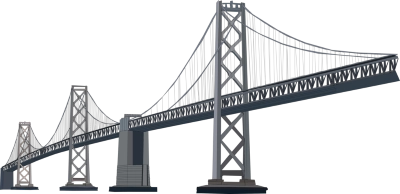Signification du mot bridge en français
Que signifie bridge en anglais ? Découvrez la signification, la prononciation et l'utilisation spécifique de ce mot avec Lingoland
bridge
US /brɪdʒ/
UK /brɪdʒ/

Nom
1.
pont
a structure carrying a road, path, railway, or canal across a river, ravine, road, railway, or other obstacle
Exemple:
•
The old stone bridge crosses the river.
Le vieux pont de pierre traverse la rivière.
•
They built a new bridge to connect the two islands.
Ils ont construit un nouveau pont pour relier les deux îles.
2.
arête du nez
the upper bony part of the nose
Exemple:
•
She wears her glasses on the bridge of her nose.
Elle porte ses lunettes sur l'arête de son nez.
•
He broke the bridge of his nose in the accident.
Il s'est cassé l'arête du nez dans l'accident.
3.
lien, passerelle
a connecting or transitional passage or link
Exemple:
•
The program aims to bridge the gap between theory and practice.
Le programme vise à combler le fossé entre la théorie et la pratique.
•
Music can act as a bridge between different cultures.
La musique peut servir de pont entre différentes cultures.
Synonyme:
Verbe
1.
construire un pont, relier
to make a bridge over (something)
Exemple:
•
They plan to bridge the river with a new structure.
Ils prévoient de construire un pont sur la rivière avec une nouvelle structure.
•
The engineers will bridge the gap between the two cliffs.
Les ingénieurs vont combler le fossé entre les deux falaises.
2.
combler, rapprocher
to reduce or get rid of the difference between two things or groups of things
Exemple:
•
The new policy aims to bridge the economic divide.
La nouvelle politique vise à combler le fossé économique.
•
Her research helped to bridge the gap between different scientific fields.
Ses recherches ont aidé à combler le fossé entre différents domaines scientifiques.